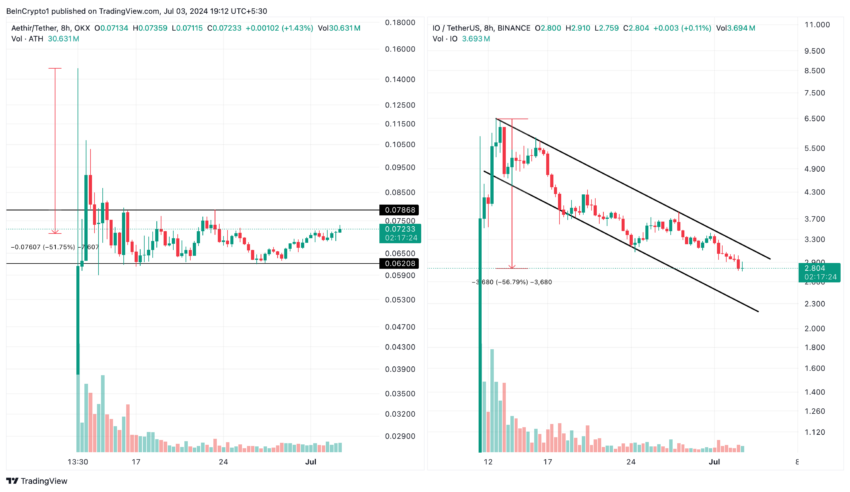More than 20 days after their eagerly awaited token listings, two prominent decentralized physical infrastructure network (DePin) projects, Aethir (ATH) and io.net (IO), have watched their market values drop by more than half.
This decline has sparked concerns among investors. These projects, aimed at providing decentralized access to crucial GPU resources, have faced significant setbacks despite notable advancements and partnerships.
ATH and IO Tokens Faces Market Challenges
Aethir and io.net, whose tokens debuted on June 11 and 12, respectively, initially captivated the market with their vision of democratizing access to high-performance computing power. Specifically, Aethir has forged partnerships across the gaming and artificial intelligence sectors.
“Our partnerships with gaming and AI companies leverage Aethir’s decentralized GPU cloud, enhancing our ecosystem,” Aethir said.
Concurrently, io.net announced strategic alliances with Hemera and GamerHash AI, with objectives to boost AI functionalities and enrich gaming experiences.
Read more: What Is DePIN (Decentralized Physical Infrastructure Networks)?
Despite these efforts, both tokens have substantially underperformed. Currently, Aethir’s value has decreased by 51.75%, fluctuating between $0.0786 and $0.0620. This trading range suggests a consolidation phase, with the potential for further decline or a slight recovery depending on market trends.
Conversely, io.net has consistently trended downward within a parallel channel, signaling a persistent drop in investor trust unless a notable market turnaround occurs. It is down by over 56% from its all-time highs.

This downturn followed the implementation of several crucial features. For example, io.net introduced block rewards on June 25, offering compensation in its native IO token to users who lend their GPU or CPU power to the network.
Read more: Top 12 Crypto Companies to Watch in 2024
The financial instability of these tokens highlights the broader challenges faced by the GPU-based DePin sector. The demand for decentralized computing resources continues to escalate, fueled by the growing need for AI applications and>
 beincrypto.com
beincrypto.com
